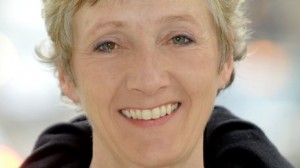The BBC must evolve to meet the challenges of an increasingly digital media landscape but must also be valued for future generations, one of its senior managers told West business leaders at the annual CBI regional dinner.
Jenny Baxter, pictured, who as chief operating officer, BBC England, is in charge of the BBC’s Bristol operations, mounted a robust defence of the corporation as it continues to come under fire from the Government and commercial media operators. 
She said the BBC was respected across the world as a by-word for impartial news reporting and high-quality programmes.
“As a former head of foreign news I know how the BBC is seen worldwide. Foreign correspondents know the BBC’s name opens doors. Even tyrants have given the BBC access.”
Ms Baxter, who is also a former controller of BBC News Production, said it was only in the UK that the BBC provoked strong views. The Government’s Green Paper on the future of the BBC questions whether it should continue to try to be “all things to all people” with an output that included Strictly Come Dancing and Radio 1 that could be produced by commercial organisations.
But the BBC was for everyone, she insisted, and for a licence fee of £2.80 a week everyone whatever their taste could take out something from the BBC – whether news, information, entertainment or education – as they had done since it was founded in 1922.
That meant the BBC’s output continuing to span everything from the Today programme on Radio 4 and the Great British Bake Off.
The BBC had to evolve and had to meet new challenges – among them doing more in the regions and better representing the whole country, she told the 300 guests at the dinner, which was sponsored by Barclays and Bristol law firm Burges Salmon.
The BBC’s commitment to Bristol, where it has had a base in Whiteladies Road for 80 years was strong, she said, and the commitment of its staff was a key part of the BBC’s success. BBC Bristol is the base of its world-leading Natural History Unit as well as producing factual and drama shows for TV and radio.
“In my view the BBC must evolve and continue to earn the love and respect of the people,” she said. “It must adjust to an ever-changing world. Challenge it but let’s make sure we value it and look after it for the future generations.”
The dinner at held at the Marriott Bristol City Centre hotel also heard from CBI South West chair Steve West and Lee Everson, regional head of large corporate banking at Barclays.
Tributes were also paid to former CBI South West chair Graham Cole, who stepped down from his role after many years of service to businesses across the region.
Former Defence Secretary Geoff Hoon was among the guests at the dinner and congratulated Mr Cole, a former chief executive of Yeovil helicopter manufacturer AgustaWestland, on his commitment to British industry.
John Cridland, CBI Director-General, also recorded a video tribute to Mr Cole, thanking him for his contribution to the aerospace industry and the work of the CBI.
CBI South West director Deborah Waddell said: “It was a fantastic evening that provided our members the opportunity to discuss important topics affecting businesses across the region, such as the recent devolution announcement.
Lee Everson of Barclays added: “This a key date in the business calendar attracting many of the region’s leading businessmen and women. It provided the perfect opportunity to showcase the exceptional talent the region has to offer during what was an informative and entertaining evening.”
Other businesses supporting the dinner were Luscombe Drinks, Marshfield Bakery, Ministry of Cake, Orchard Pig, Plymouth University, Smurfit Kappa. Stormpress, Wadworth, Wyke Farms and Yeo Valley.






























